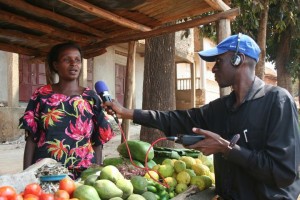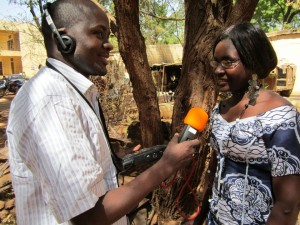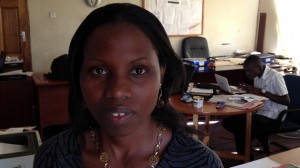Search Results for Tag: Radio
Trainer recommendation: Adapter & MPEG Streamclip
“What software can I use for converting and compressing files?”
It’s a question trainers are often asked on broadcast and multimedia courses involving a lot of work with audio and video files.
Adapter and MPEG Streamclip are a good starting point. Both are free and work on either a PC or a Mac.
These tools are particularly useful as video or audio Swiss Army knives – between them they can handle just about any sort of file and convert or compress it to whatever size or format you need.
And both tools let you create a batch list if you have a lot of files to convert or compress at the same time.
![]() read more
read more
Understanding your target audience
By Bettina Ruigies
Today’s fast moving media environment requires a lot of flexibility from media workers. Multimedia skills are a must. Journalists need to be able to produce stories for radio or television, print or online. At the same time, digitization, the Internet and affordable equipment enables anyone who wishes to open a TV station on YouTube or at least run a blog site.
All this technical innovation offers tempting perspectives for hard working and talented journalists. But frustration and failure might set in when it turns out that hardly anybody is watching or reading.
![]() read more
read more
Sound sharing for journalists (Part 1) – SoundCloud
 Earlier this year the Berlin-based sound sharing service SoundCloud announced it had hit 10 million users worldwide – since then users have risen to 13 million. At the same time, more and more media organisations are using the site to host and distribute their news. So, how good is it really and what do you need to know?
Earlier this year the Berlin-based sound sharing service SoundCloud announced it had hit 10 million users worldwide – since then users have risen to 13 million. At the same time, more and more media organisations are using the site to host and distribute their news. So, how good is it really and what do you need to know?
![]() read more
read more
Vox Pop (part II): How to find a good topic and ask the right question

In the first part of our series about the vox pop, we discussed the pro’s and con’s of the vox pop as a journalistic format. Now, let’s get down to the actual business of making a vox pop.
Before you decide to produce a vox pop, you should make sure that the topic lends itself to this format. The spectrum of possible topics ranges from politics, business, sports and religion to social issues and everyday problems.
The best topics for vox pops are controversial issues that move the people. With these kinds of issues, you can be fairly sure that the answers you get from the people will be varied, interesting and usable. But other topics, such as consumer behavior, recreational activities, etc. are also possible.
What’s important is that the issue must be topical and of general interest. If only a minority of your listeners is interested in the topic of the vox pop, you run the risk that the majority of your audience will switch off. And it is very difficult to win back lost listeners.
![]() read more
read more
Ghana radio stations getting to know their listeners

What is your most preferred radio station? At what times do you listen to radio? And what topics are you most interested in hearing on the radio?
If you’re living in one of the Ghanaian cities and towns with broadcasters participating in the new Our Radio! project, somebody might come to your doorstep to ask these questions. Audience research is underway.
A total of 1700 interviews are being conducted, two to three hundred in each of the regions where one of the nine radio station partners in the project is located.
Trained research interviewers have a questionnaire with around 50 questions for randomly selected respondents designed by the research organization Pragma Solutions. It was tailored to the needs of the radio stations by station managers at a research workshop held in May.
![]() read more
read more
Our Radio! – working with radio stations in Ghana
 “Our Radio!” is a cooperation project between the German Agency for International Cooperation (GIZ), DW Akademie and the Ghana Independent Broadcasters’ Association (GIBA).
“Our Radio!” is a cooperation project between the German Agency for International Cooperation (GIZ), DW Akademie and the Ghana Independent Broadcasters’ Association (GIBA).
![]() read more
read more
Vox Pop: What’s good and bad about this journalistic format?
 Radio and TV programs are not an end in themselves – journalists don’t produce them for their own self-fulfillment, but to meet the needs of their audience. Journalists write news bulletins and reports to meet the audience’s information needs and they produce music programs to entertain their audience.
Radio and TV programs are not an end in themselves – journalists don’t produce them for their own self-fulfillment, but to meet the needs of their audience. Journalists write news bulletins and reports to meet the audience’s information needs and they produce music programs to entertain their audience.
All of these journalistic formats have one thing in common: they are produced and presented by professionals. And the other voices that appear in the sound clips are most often those of politicians, experts or high-ranking people.
The average citizen hardly ever appears on the air – unless the program uses vox pop. This expression is short for the Latin term, “vox populi” and means “the voice of the people”. When this “voice of the people” is heard, the audience knows that “normal people”, very much like themselves, also have a place in broadcasting. They feel appreciated and taken seriously by the radio or TV station. And this in turn strengthens the audience’s “loyalty” to the station.
For a “vox pop”, journalists ask a number of randomly selected people the same question, collect the answers and string them together. The different answers create an idea of the variety of opinions existing within the population.
Journalists usually conduct these “one-question interviews” in public places where you can find many different kinds of people.
![]() read more
read more
Mic me up – working with microphones
What’s the right microphone to use?
It would be fair to say in our work across Africa, DW Akademie trainers see just about every type of microphone ever manufactured in use.
Whether it’s in a studio, plugged into a digital recorder or a video camera, we’ve seen and heard everything. From the most expensive specialist mics, to budget mics to microphones that are working antiques, lovingly maintained and still producing quality sound.
![]() read more
read more
Atelier des journalistes sur fond du coup d’état au Mali
Les chances pour que l’élection présidentielle au Mali se déroule de façon démocratique étaient bonnes. Après deux mandats, le président Amadou Toumani Touré n’avait même pas essayé de se porter de nouveau candidat. C’est environ cinq semaines avant la présidentielle que notre séminaire a commencé. Il portait sur la formation de journalistes radio pour la couverture du scrutin.
![]() read more
read more
Journalists@Work: Teresa Temweka Chirwa
In the first of our Journalists@Work series we meet Teresa Temweka Chirwa, an editor at Zodiak Broadcasting Station in Lilongwe, Malawi. Teresa participated in the recent DW Akademie in-house journalism training at ZBS. You can also listen to Guy Degen’s interview with Teresa below to find out more about working as a journalist in Malawi.
![]() read more
read more













Feedback